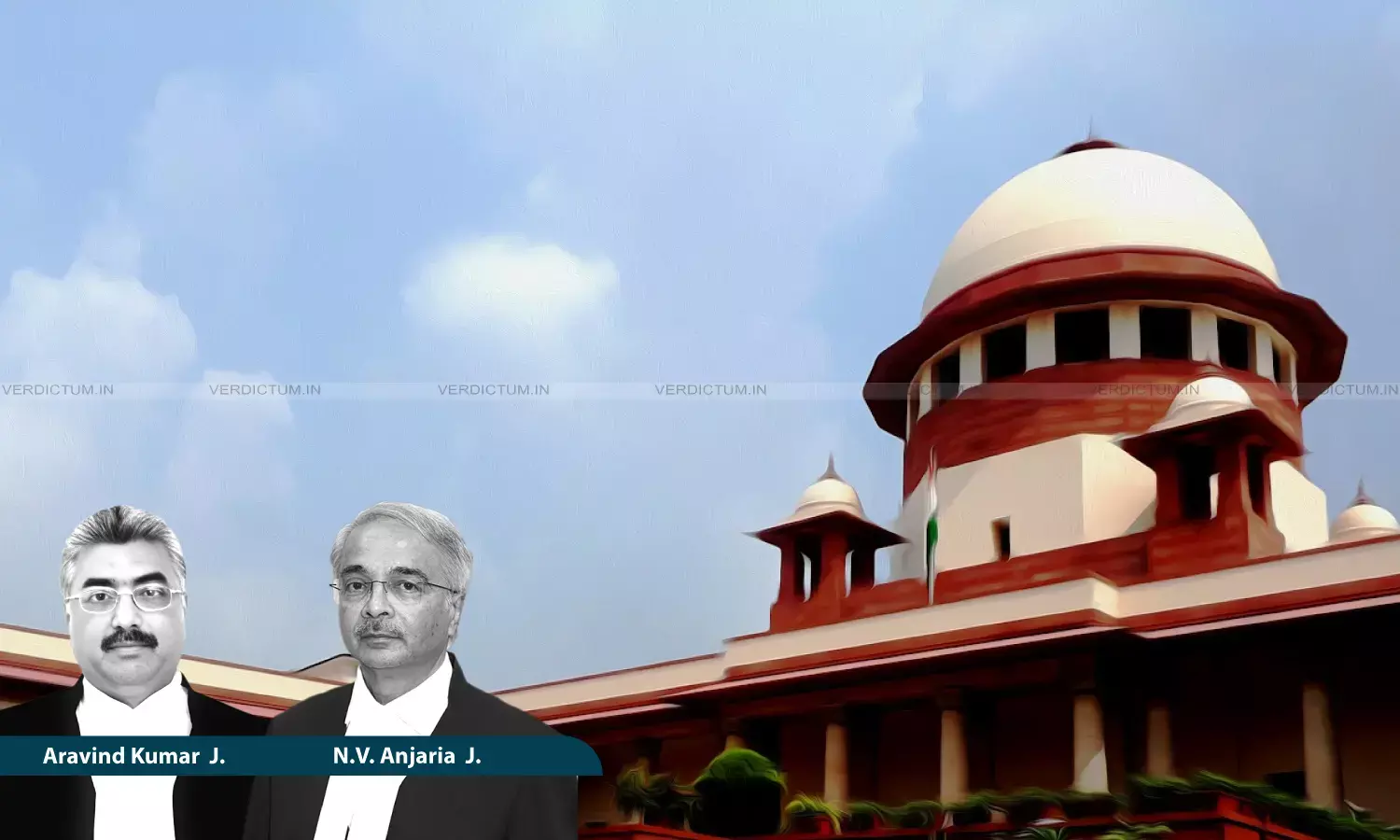Reappreciation Of Evidence Not Undertaken Under Article 136 Of Constitution When Concurrent Findings Are Supported By Public Documents Without Perversity: Supreme Court
The Appeal before the Supreme Court was directed against the judgment of the Madras High Court affirming the judgment whereby the demand raised by the Chennai Metropolitan Development Authority towards Open Space Reservation charges was quashed.

Justice Aravind Kumar, Justice NV Anjaria, Supreme Court
The Supreme Court has held that it would not disturb a finding which would amount to reappreciation of evidence while exercising its jurisdiction under Article 136 particularly where the findings are concurrent, supported by public documents, and the findings suffer from no perversity.
The Appeal before the Apex Court was directed against the judgment of the Madras High Court affirming the judgment whereby the demand raised by the appellant–Authority for a sum of ₹1,64,50,000 towards Open Space Reservation charges was quashed and a direction was issued to refund the said sum with interest at the rate of 8% per annum.
The Division Bench of Justice Aravind Kumar and Justice N.V. Anjaria held, “The appellant’s bald assertion that sub-division occurred in 2008 is a mere ipse dixit, devoid of proof, and cannot prevail over contemporaneous registered instruments whose authenticity is not in dispute. The High Court was right in relying upon these materials to hold that the sub-division existed prior to 1975 and same cannot be faulted. To disturb such a finding would amount to reappreciation of evidence, which this Court in exercise of its jurisdiction under Article 136 will not ordinarily undertake, particularly where the findings are concurrent, supported by public documents, and findings suffer from no perversity.”
Factual Background
The property in question traced its lineage to the estate of one Haji Syed Ali Akbar Ispahani, who died leaving behind his widow, his sons, and daughters. The heirs, in order to bring about a complete division of their respective rights, executed a registered partition deed and an extent of about 21 (twenty-one grounds) situated a plot of Nungambakkam Village fell to the share of Syed Jawad Ispahani, one of the sons. By two gift deeds, Syed Jawad Ispahani gifted certain grounds to his sons. In 1984, out of his holding of 11 grounds, one of the sons executed a gift deed gifting away a small portion of 125 sq. ft. to the Laymen’s Evangelical Fellowship. The respondent herein, a medical professional intending to establish a super-speciality hospital, purchased from Syed Ali Ispahani under a registered sale deed 10 grounds and 2275 sq. ft.
Upon purchase, the respondent applied to the appellant Authority for planning permission. The application was initially rejected on the grounds that the proposal was hit by Regulation 26(2) of the Development Regulations. The State Government, however, granted an exemption from Regulation 26(2), subject to compliance with technical conditions. Thereafter, the appellant Authority demanded, a sum of ₹1,64,50,000 as Open Space Reservation charges (OSR), calculated in lieu of land. The respondent made a representation pointing out that her site was less than 3000 square metres in extent and hence exempted under Annexure XX of the Development Regulations.
The Chennai Metropolitan Development Authority (CMDA) rejected this representation and insisted on payment. In order to secure permission and avoid delay, the respondent, under protest, deposited the demanded sum Rs 1,64,50,000 and simultaneously approached the High Court under Article 226 of the Constitution. The Single Judge directed the refund and the Division Bench, by the impugned judgment concurred with the Single Judge and dismissed the appeal.
Reasoning
The Bench was of the view that the deeds in question, executed years prior to August 5, 1975, were unimpeached, formed part of the record, and signified a lawful familial conveyance or arrangement.
“Once this series of registered deeds and pattas were produced and the initial evidentiary burden was discharged, same shifted to the appellant–Authority to establish that, notwithstanding these instruments, the property was not lawfully sub-divided prior to 05 August 1975. This burden has not been discharged. No material has been placed to show that the pattas were procured post-1975, nor is there any evidence that the subdivision lacked recognition under planning law as it then stood”, it stated.
As per the Bench, the respondent’s holding being 2229 square metres fell squarely within the Nil slab. The attempt to recombine it notionally with the erstwhile 21-ground parent estate was contrary both to fact and to the text of the regulation. “To accept such a construction would be to ignore the legislative exemption and retroactively enlarge the liability”, it said while also adding, “The High Court was also correct in observing that the respondent had not formed any layout. Consequently, there was no occasion to invoke provisions meant for layout promoters. The respondent merely sought to develop her site by constructing a hospital.”
The Bench further held, “This Court has consistently held that in the exercise of jurisdiction under Article 136, interference is warranted only where manifest illegality, perversity, or grave miscarriage of justice is demonstrated. No such infirmity is made out here. On the contrary, the concurrent reasoning of the courts below is in consonance with both fact and law.”
The Bench dismissed the appeal and affirmed the direction of the High Court to refund the sum of ₹1,64,50,000 with interest at 8% per annum.
Cause Title: Chennai Metropolitan Development Authority v. Dr. Kamala Selvaraj (Neutral Citation: 2025 INSC 1200)
Appearance
Appellant: Additional Advocate General Balaji Subramaniam, AOR G. Indira, Advocates P Gandepan, Akash Kundu, Amrita Kumari, Anjali Singh, Raniba Pangnila
Respondent: AOR Vikas Mehta, Advocates Nitika Grover, Nishant Anshul

